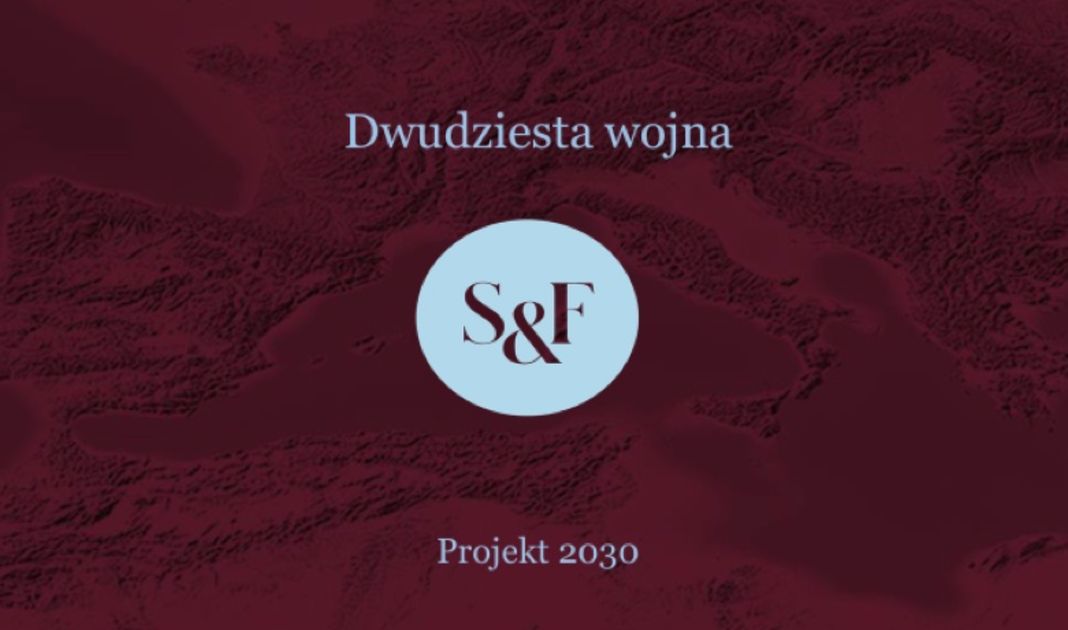Report from the “Twentieth War” S&F. Part 2

– energy (less and less)
– geographical location (more and more – if Eurasia is established under the economic leadership of China, Europe will follow Macron in the direction of strategic independence, and less and less – if this does not arise and the Atlantic world remains united)
– military force realised by a new generation of war to stabilise the periphery of Europe and to play for the balance of European countries against Turkey, China, the Middle East, and maybe one day even against the USA (a dream in Moscow – to be an “expeditionary force and a military projection of power” for a “soft empire Europe with independence from the USA “in exchange for capital, technology and a decisive vote in its geopolitical neighbourhood”).
Non-kinetic methods are of course favoured in the next generation of warfare, but they are achieved under the umbrella of military domination across the full range of the escalation ladder.
So we answered the question at S&F, what is Russia’s centre of gravity that must be overcome/conquered/broken?
The centre of gravity (Clausewitz, Schyszneunkt) is simply defeating the Russian army, also at the level of demonstrating such abilities.
When we established this in the course of the workshops, we decided to answer the next question: in so far as the nature of war does not change (forcing the opponent to implement the winner’s will and subject him to his agency), and in so far as it changes, what is its “grammar”?
Remembering, and about this in Poland, we forget to strictly and always stick to the correlation with political goals, as befits a serious and permanent state that has a chance to win the game, and not just to despair and call out to others for help.
The initial conclusions are as follows:
There is a need to create our own protection system in the Intermarium, which I would call “protection by denial”. Not so much “deterrence” but “protection”, because the Russian civilisation project is unattractive and this is enough to defeat the Russian threat, and therefore its armed forces, and in particular the perception of their power (Sun Tzu – it is best to defeat strategy by breaking its perception).
As a part of an “active defence” in the eastern foreground then, we have an umbrella to protect against presumed Russian control of the escalation ladder and the resulting presumed violence and its use of political agency. And then a concert of powers in the European system with Russia and at our expense.
The threshold for achieving this goal is not as high as the Poles, strangled by Soviet domination and then stunned by the vision of the end of history, by their thoughts, fearing the presumed Russian power, against which we have no chance. At least, the threshold is not high enough to face it and to ask only Western countries for an intervention that they may not want or may not be capable of or have no interest in.
That’s what we think at S&F.
This is what they certainly think in Ankara and Istanbul, because that’s exactly what they have been doing for several years, effectively. In practice, and not like us at S&F – on paper or at S&F’s cozy premises.
It can be said that the Turks are implementing elements of the old Polish Promethean policy towards the East using their own elements of a new generation Turkish war, as was evident in Syria, Libya and the Caucasus.
The matter is simple, but how very difficult – one has to defeat Russian power.
In the military dimension, first of all, it is necessary to establish a real political goal for Poland of a possible armed conflict and specific political conditions for the involvement of Polish armed forces. This is not about the general perspective of the conflict with Russia, but the clarification of a specific tangible goal, or rather goals – what the war would have to bring in order for us to recognise that we had won it. This means the necessity to answer very specific questions: what kind of war are the Polish armed forces to prepare for? Without such planning, the entire effort to modernise, reform, and then take military action is usually in vain, and military successes do not translate into political benefits. Meanwhile, war is only an instrument of politics, about which our homeland, torn by successive continental and world wars, and its elite probably do not know or have forgotten.
What kind of war are we preparing for: allied or independent, universal or limited, at sea or on land, east of our borders, or maybe for a defensive war, or, just like 15 years ago, for an expeditionary war. What will be the specific theatre of war and the area of operations and movement, and therefore what will be its operational basis, and what will be the communication lines leading to the place of hostilities. Finally, and this is important nowadays – how to match signals and military or war goals with political goals in the everyday “mill” of events in order to win the war before its kinetic phase begins, and then to win the informational, narrative and political domain. War is a complex and strictly political matter. One can risk a statement that warfare itself is only a fragment of a larger whole that needs to be fastened, tasked, organised, calculated, etc.
Once this is established, we should begin to think about what would be the military goal of such a war, and therefore what tool (i.e. what armed forces) we need to achieve this goal. The tool must be tailored specifically to the assumed goals of political war. From this will result the so-called centre of gravity of the opponent, which must also be determined in the process of shaping the grand strategy of the state, and therefore also determines what threats the state might be exposed to. Of course, we must also understand what are the goals of the enemy’s war and what is our centre of gravity, the breaking of which would mean our political, often military defeat.
Once we have established the centre of gravity, we will know what tools we need (large, small, heavy, mobile, mass-conscript or professional armed forces, for universal or limited war, for guerrilla or conventional operations, for operations on land or at sea, a high degree of symmetry and intensity).
We must analyze the Russian way of thinking about the armed conflict, and in particular the desire to control each link in the chain of escalation of the conflict, in order to seek the right answer to each of the possible phases of the war.
Once we have established this, we will consider how to use this tool. For this, we need to consider what it should be capable of – and therefore what capabilities our armed force should have, and in general the entire system of state management and resistance. Here there is a need to prepare, among others an operational concept as well as the military technology and the military organisation to implement these capabilities. Then there is a method of verifying the tool, which is the army arranged in this way, i.e. the entire system of fitness and readiness assessment, a system of promotion and advancement, exercises, motivation, doctrine, creating improvements and advantages at the operational and tactical level, or implementing technologies towards an increase in capabilities for combat potential.
The army prepared in this way is an instrument of state policy also in peacetime, because it serves as a strategic signaling and as such acts as a deterrent to the aggressor or as a factor of balance in the event that the constructivist system of the international order is departing. We are dealing with this process now, so the need for change is urgent. We need a tool and for this we need our own operational concept, designed in Warsaw.
Autor
Jacek Bartosiak
CEO and Founder of Strategy&Future, author of bestselling books.






Trwa ładowanie...